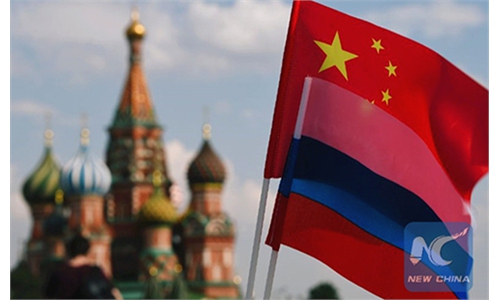
Illustration: Liu Rui/GT
Since Joe Biden took office, US foreign policy has undergone significant adjustments. It seems that the Washington that we are familiar with has returned to the world stage. Even though the Biden administration's diplomatic thinking can by no means return to what it was during the presidency of Barack Obama, it still is a mixture of the policy legacy of the last two US presidents.This is clearly reflected in Washington's policies toward Beijing and Moscow. The Cold War mentality of competition held by the US has not weakened, instead, it continues to strengthen under Biden's slogan of uniting US allies and building value-oriented diplomacy. Washington is making another serious strategic mistake.
At the policy level, the Biden administration has not stopped suppressing China and Russia. This will only give the two countries more common ground to coordinate needs on issues regarding the US.
In terms of China, the US government is still comprehensively assessing its overall strategy and policy framework toward China. But it has clearly positioned China as the "most serious competitor" and made managing China's rise the greatest geopolitical challenge to the US. Washington claims to seek "competition without catastrophe" with Beijing and to gain advantages by strengthening itself and its so-called moral leadership. It hopes to win the strategic competition that will define the landscape of the world in the 21st century.
Regarding Russia, the Biden administration continues to view moves from Moscow as security threats and challenges. It has no intention of resetting US-Russia relations in the short term. It has accused Russia of interfering in the US election. It is also using the Navalny affair as a reason to jointly introduce sanctions against Russia with Europe. Relations between the two countries have hit a new low.
During Donald Trump's presidency, some in the US strategic community suggested that Washington should ease relations with Moscow. Some even put forward the idea that Washington should draw Moscow over to its side to confront Beijing. However, the Biden administration is still taking the path of confrontation with both countries at the same time. This precisely shows that Washington has lost the necessary ability to correct its strategic mistakes under the current situation.
On the one hand, the Biden administration recognizes the reality of the relative decline of US strength in the world. It believes that peace and development are no longer the mainstream international situation; only through competition can the US regain its leadership position. As Europe is one of the US allies, China and Russia have naturally become the most powerful competitors in Washington's eyes.
However, the Biden administration has adjusted the way of competition. Instead of using rude power or fighting alone as Trump did, Washington now emphasizes value-oriented diplomacy to build Western consensus. In this way, the US reduces the pressure of competition through the alliance system, hoping that this bloc-like confrontation will win a dominant position for it.
On the other hand, diplomacy is the extension of internal politics. US domestic politics is increasingly becoming an important factor in shaping US foreign policies. Although the transition of power has completed, the US has not transited from "Trumpism" to "Bidenism." Forces that support Trump still exist. Moreover, the China and Russia policy of the new administration is largely confined by US domestic politics.
Until the 2022 mid-term election (or even the 2024 presidential election), foreign policy can hardly become a plus for Biden and his Democratic Party to obtain more votes. The American public cares more about whether the government can lead the country out of the pandemic and revive the economy. At a time when US political polarization intensifies, Biden will not compromise with the Republicans. In this case, he may be propelled to give way in foreign policies and choose a tougher approach in dealing with China and Russia.
Therefore, as the Biden administration continues to label China and Russia as "strategic competitors," it can only adapt to the means of competition in concrete agendas. It must manage matters in exchange for the Republicans' support and cooperation in domestic affairs. The US only eyes for short-term gains regardless of long-term impacts. But if it continues to indulge in a Cold War-like confrontational mentality, this will be a major mistake. It may very well lead to the US to make strategic mistakes with their courses of action.
The author is an assistant research professor at the Institute of American Studies, China Institutes of Contemporary International Relations. opinion@globaltimes.com.cn


